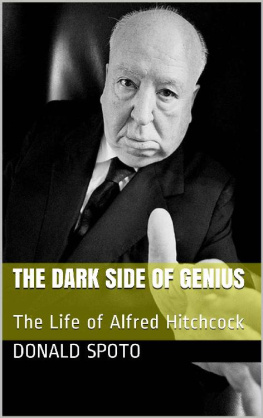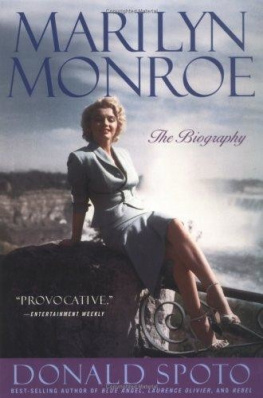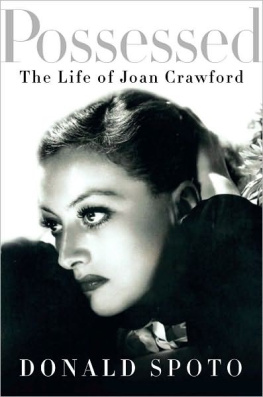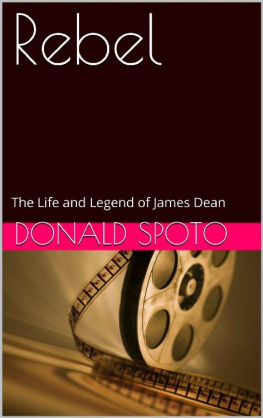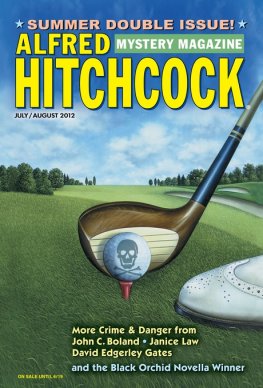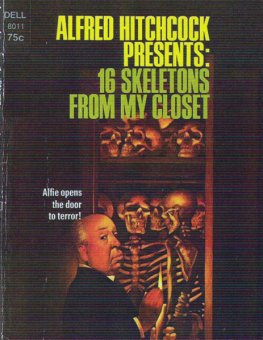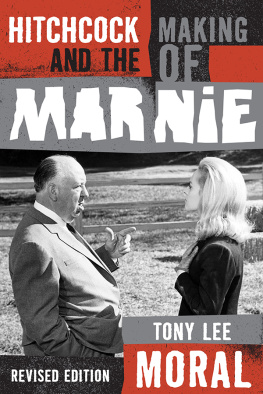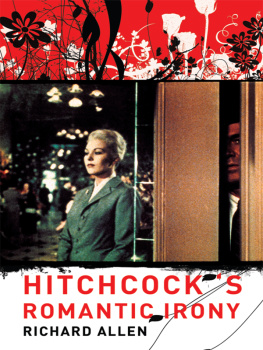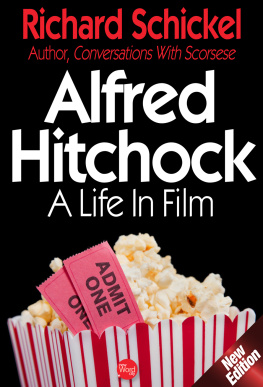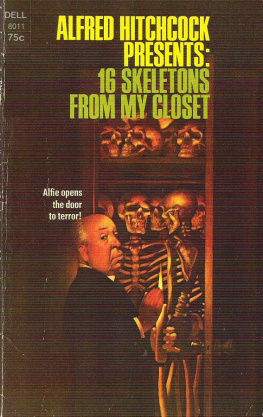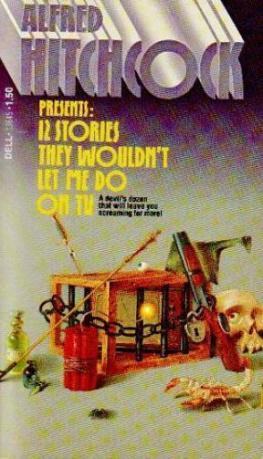Donald Spoto - The Dark Side of Genius: The Life of Alfred Hitchcock
Here you can read online Donald Spoto - The Dark Side of Genius: The Life of Alfred Hitchcock full text of the book (entire story) in english for free. Download pdf and epub, get meaning, cover and reviews about this ebook. year: 2015, publisher: Dansker Press, genre: Home and family. Description of the work, (preface) as well as reviews are available. Best literature library LitArk.com created for fans of good reading and offers a wide selection of genres:
Romance novel
Science fiction
Adventure
Detective
Science
History
Home and family
Prose
Art
Politics
Computer
Non-fiction
Religion
Business
Children
Humor
Choose a favorite category and find really read worthwhile books. Enjoy immersion in the world of imagination, feel the emotions of the characters or learn something new for yourself, make an fascinating discovery.
- Book:The Dark Side of Genius: The Life of Alfred Hitchcock
- Author:
- Publisher:Dansker Press
- Genre:
- Year:2015
- Rating:3 / 5
- Favourites:Add to favourites
- Your mark:
- 60
- 1
- 2
- 3
- 4
- 5
The Dark Side of Genius: The Life of Alfred Hitchcock: summary, description and annotation
We offer to read an annotation, description, summary or preface (depends on what the author of the book "The Dark Side of Genius: The Life of Alfred Hitchcock" wrote himself). If you haven't found the necessary information about the book — write in the comments, we will try to find it.
The Dark Side of Genius: The Life of Alfred Hitchcock — read online for free the complete book (whole text) full work
Below is the text of the book, divided by pages. System saving the place of the last page read, allows you to conveniently read the book "The Dark Side of Genius: The Life of Alfred Hitchcock" online for free, without having to search again every time where you left off. Put a bookmark, and you can go to the page where you finished reading at any time.
Font size:
Interval:
Bookmark:
The Dark Side of
Genius
The Life of Alfred
Hitchcock
Donald Spoto
Copyright 1999, Donald Spoto
for Kirtley Thiesmeyer,
with gratitude for the constancy of friendship
Contents
Introduction
1999The Hitchcock Centennial
August 13, 1999 marks the one hundredth birthday of Alfred Hitchcock.
Centennial celebrations are customarily reserved for presidents or statesmen, notable humanitarians or scientists, saints or philanthropiststhose who, in some extraordinary way, made their mark on society. When the memory of a creative artist is honored, the individual is usually an exponent of so-called high culturea composer, painter, or writer.
But this year, Alfred Hitchcock's cool, restrained expression and the outline of his famous form seem to pop up everywhereon postage stamps and magazine covers, on movie marquees, in newspaper articles, and (the ultimate accolade) on T-shirts. You can see his films in commercial re-release at local theaters; young directors remake Hitchcock movies; and through your computer, you can tap into hundreds of electronic websites offering everything from scholarship to trivia about Hitchcock. And then there are the seminars and celebrations, lectures and screenings, solemn commentaries by academics and reminiscences by colleagues. Few other popular artists have commanded such enthusiastic personal commemorations almost twenty years after their deaths.
There's good reason for all this fascination. Hitchcock gave us movies remarkable for perennial freshness, engaging wit, and acutesometimes terrifyingpertinence to our own time. Most people seeing The 39 Steps, The Lady Vanishes, Shadow of a Doubt, Notorious, Rear Window, Vertigo, North by Northwest, or Psychono matter where in the worldwould be greatly entertained. Not many filmmakers have this kind of staying power.
But at least some of our fascination may be with the enigma of Hitchcock himself. His self-presentation was not nearly so visceral, so emotionally direct as his work, and the mystery of Hitchcock himself was, for a long time, as puzzling as any of the plots of his espionage thrillers. During his lifetime, he carefully cultivated an image of bourgeois normality: the dark suit and tie, the expressionless monotone, the dry humor, the calm control; this was the sum of the character he wanted us to accept. But he was, of course, far more complex than that. No one responsible for such a unique body of work could possibly be so common, so irksomely flat, so unflappable as the persona he marketed. In a culture that shines a light on everything, he kept us in the dark.
Hitchcock was a brilliant craftsman and a dedicated artist. Despite his private demons, his obsessive privacy and his sense of being a marginal man provided the conditions for a life of astonishingly fertile, uninterrupted creative work. He had an uncanny ability to locate and diagnose much of the psychological suffering of the world, much of the delusion and sickness just below the surface of polite society. He spoke to us out of the twentieth century's sense of guilt, angst, and obsession with violence, sex, and the detached machinery of death. Hitchcock was one of the supreme artists of our time, a poet of anxiety and a romantic in spite of himself.
Out of his own fearful isolation and from behind a deliberately deceptive mask of remoteness and inaccessibility, he spun for us tales of human need and longing, stories of depravity, of loss, and of hope. With a witty but profound moral cynicism, he synthesized universal fearsa peculiarly modern terror of accident and chaos and a fear of losing control. And the exactitude of his moviemaking was his way of taking a stand against that chaos, which is (almost invariably) routed at the final fade-out.
I write and speak his name with respect for all the pain that encircled his eighty years, and for the wise wit and wily detachment with which he described humanity's frailty, its failings, and (let it be clearly said) its potential for honor. My hunch is that Alfred Hitchcock will still be speaking to us a hundred years from now, when his bicentennial rolls around.
D. S.
Los Angeles
May 1999
Preface
M Y fascination with Alfred Hitchcock began over thirty years ago, while I was a schoolboy and he was quickly becoming an international institution. Approaching the height of his popularity in the early 1950s, he was giving us a motion pictureand sometimes twoannually, and part of the fun was watching for his quick cameo appearance as he walked past an actor or boarded a train. Then, as if he wanted to extend his ample presence right into our living rooms, he became the host of his own weekly television series. With his nearly expressionless descriptions of the most antisocial conduct, he seemed to me like someone from another world, a land where murder was routine .and betrayal the typical response of one person to another. At the same time, his face peered out from bookracks, where collections of tales were marketed as Hitchcock anthologies. His presence touched every medium of entertainment and communication; hardly a month passed without a Hitchcock interview in the local newspapers and national magazines.
Twenty years laterin 1975, to be exactI met him for the first time. He invited me to watch him at work on Family Plot, his fifty-third feature-length movieand, as it turned out, his last. I was near to completing a book about his films, and he took time between scenes to answer some technical questions. Then, a year later, he kindly acknowledged the publication of The Art of Alfred Hitchcock by inviting me to luncheon. By this time, he was firmly established as a legend, and I was firmly established in awe of him. The awe remained undiluted during subsequent meetings and luncheons. But we discussed at these times only what Hitchcock wanted to discuss, and I had the impression that he was directing conversations the way he directed his filmsto include only what he wanted to include, to reveal as little as possible of himself and as much as possible of others. He was always cordial, but there was a cautionary coolness in his manner, as if he feared a sudden unmasking of his real, carefully hidden feelings. This, I quickly learned from earlier research, was an impression also left upon colleagues and associates who had known him for years. Very easily, this most public of popular cultural figures withdrew into a secret shell when one showed interest in the deepest levels of his work, or in his background or family or inner life or certain large periods of his career. He was smoothly adept, at these times, in changing the subject.
When he died in 1980, I asked his daughter, Patricia Hitchcock O'Connellwho also spoke for his ailing widowabout the possibility of an authorized biography. Very courteously, she told me of her father's expressed intention that no further research or work on his life be undertaken, and that therefore the family would not actively cooperate with or contribute to the preparation of such a book. This, of course, was consistent with Hitchcock's obsessive secrecy. But he was, after all, a world-renowned figure, a wealthy and powerful man; his career touched millions, and his presence continued to fascinate and invite reflection. As an admirer of his art I had for over a decade read and cataloged scores of articles and interviews, in which there occurred alarmingly contradictory statements about his life, and major gaps to be filled.
And so I proceeded. I learned at once that Alfred Hitchcock was a notoriously poor correspondent and that almost no personal letters survive. Nor did he keep diaries or journals or notebooksa fact that reflects his deep inarticulateness. This lack of written primary sources at first seemed a crippling omission. But as the facts emerged, it became clear that Hitchcock's films were indeed his notebooks and journals and that his almost maniacal secrecy was a deliberate means of deflecting attention away from what those films really are: astonishingly personal documents. As my work continuedfirst in England, where he spent half his life, and then in AmericaI turned to public records, county and family registries, school archives and studio files, as well as to those who knew him professionally and socially, to artists and writers and actors who worked with him. With the exception of a small number of people and one major studio, people felt freer after his death to summon memories, to contribute clues that led me further. Gradually, a complex image appeared, more mysterious than any of the stories he chose to film.
Next pageFont size:
Interval:
Bookmark:
Similar books «The Dark Side of Genius: The Life of Alfred Hitchcock»
Look at similar books to The Dark Side of Genius: The Life of Alfred Hitchcock. We have selected literature similar in name and meaning in the hope of providing readers with more options to find new, interesting, not yet read works.
Discussion, reviews of the book The Dark Side of Genius: The Life of Alfred Hitchcock and just readers' own opinions. Leave your comments, write what you think about the work, its meaning or the main characters. Specify what exactly you liked and what you didn't like, and why you think so.

